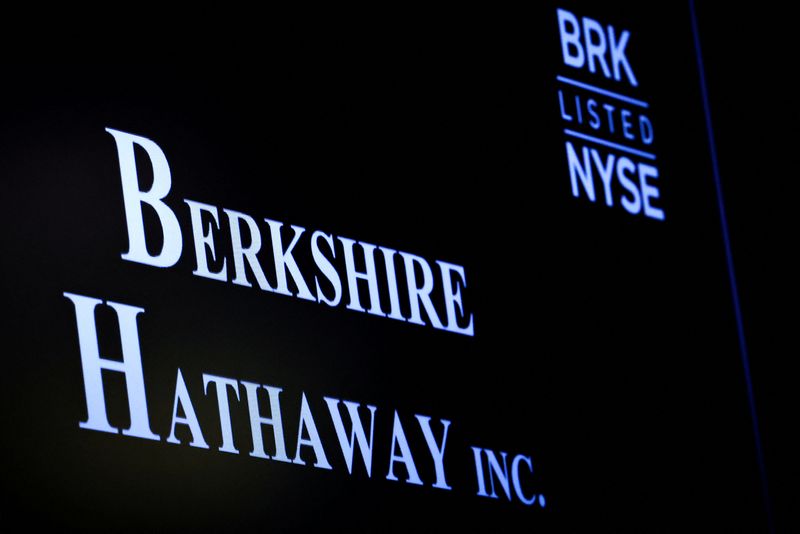By Jonathan Stempel
(Reuters) -Warren Buffett and Berkshire Hathaway (NYSE:BRKa) extended their retreat from stocks in the third quarter, further slashing holdings in Apple and boosting cash to a record $325.2 billion.
In its quarterly report on Saturday, Berkshire said it sold about 100 million, or 25%, of its Apple shares (NASDAQ:AAPL) over the summer, ending with about 300 million.
Berkshire has now sold more than 600 million of the iPhone maker's shares in 2024, though Apple remained its largest stock holding, at $69.9 billion.
It sold $36.1 billion of stock overall, including several billion dollars of Bank of America shares, and bought just $1.5 billion.
That made the quarter the eighth straight where Berkshire was a net seller of stocks.
The Omaha, Nebraska-based conglomerate also conducted no stock buybacks for the first time since the second quarter of 2018, and did not repurchase stock in the first three weeks of October.
"Berkshire is a microcosm of the broader economy," said Cathy Seifert, an analyst at CFRA Research in New York. "Its hoarding cash suggests a 'risk-off' mindset, and investors may worry what it means for the economy and markets."
The Class A shares of Berkshire are up 25% this year, while the Standard & Poor's 500 has risen 20%.
Rising valuations have fueled concerns among some investors that many stocks have become too expensive.
Berkshire's cash stake grew from $276.9 billion at the end of June, and is more than 10 times the $30 billion cushion that Buffett has pledged to maintain.
Buffett has made no major acquisitions of whole companies for his $975 billion company since 2016.
Jim Shanahan, an analyst at Edward Jones in St. Louis, said the swelling cash hoard "begs questions about whether Buffett thinks stocks are overvalued or an economic downturn is coming, or is trying to build cash for a big acquisition."
In May, Buffett said he expected Apple to remain Berkshire's largest stock investment, but selling made sense because the 21% federal tax rate on gains would likely grow.
OPERATING PROFIT FALLS
Berkshire's quarterly operating profit declined 6% to $10.09 billion, or about $7,019 per Class A share, missing analyst estimates of $7,611 per share according to LSEG IBES.
The decline stemmed largely from underwriting losses on older insurance policies, insurance claims related to Hurricane Helene in September, and currency losses from a strengthening U.S. dollar.
These offset improved profitability at the Geico car insurer, where accident claims fell. Profit also rose at the BNSF railroad, which shipped more consumer goods, and Berkshire Hathaway Energy, where operating expenses declined.
Seifert said Berkshire has long benefited from its diversification but suffered "multi-pronged" weakness in the quarter.
This included a 19% revenue decline at the Pilot truck stop chain, where fuel prices and marketing volumes fell. Berkshire also said "almost all" of its retail businesses, including its more than 80 car dealerships, are seeing revenue declines.
Net income totaled $26.25 billion, compared with a year-earlier $12.77 billion loss, reflecting unrealized gains and losses in stock investments such as Apple.
This adds volatility to net results that Buffett urges investors to ignore, and instead focus on operating performance.
HELENE, MILTON
Profit from insurance underwriting fell 69%, dented by losses from older policies, $565 million from Helene, and a bankruptcy settlement tied to a defunct talc supplier. This more than offset a 93% jump in Geico's underwriting profit.
Shanahan called the policy losses a "big surprise," while Seifert said many of Berkshire's peers have already addressed similar issues. "This stands out by making Berkshire appear to be a laggard," she said.
Berkshire also projected $1.3 billion to $1.5 billion of pre-tax losses in the fourth quarter from Hurricane Milton, which slammed into Florida in October.
Investment income at Berkshire's insurance businesses, which hold much of Berkshire's cash, rose 48% to $3.66 billion.
Such gains should decline if the Federal Reserve continues lowering interest rates, or Buffett finds something big worth buying.
Buffett "wants to invest every penny he can in businesses that provide Berkshire an advantage. But at the same time he's willing to do nothing," said Tom Russo, a principal at Gardner Russo & Quinn in Lancaster, Pennsylvania, who has invested in Berkshire since 1982.
"He'll be there ready and loaded when other investors are despairing or capital-constrained," Russo added.
Berkshire's operations also include many industrial and manufacturing companies, a big real estate brokerage, and retail businesses such as Dairy Queen and Fruit of the Loom.

On Oct. 31, Berkshire finished purchasing the 8% of Berkshire Hathaway Energy it did not already own.
Buffett, 94, has led Berkshire since 1965. He is expected to eventually transfer leadership to Vice Chairman Greg Abel, 62.